COLUMN BY MAHFUZ ANAM: A competition of errors
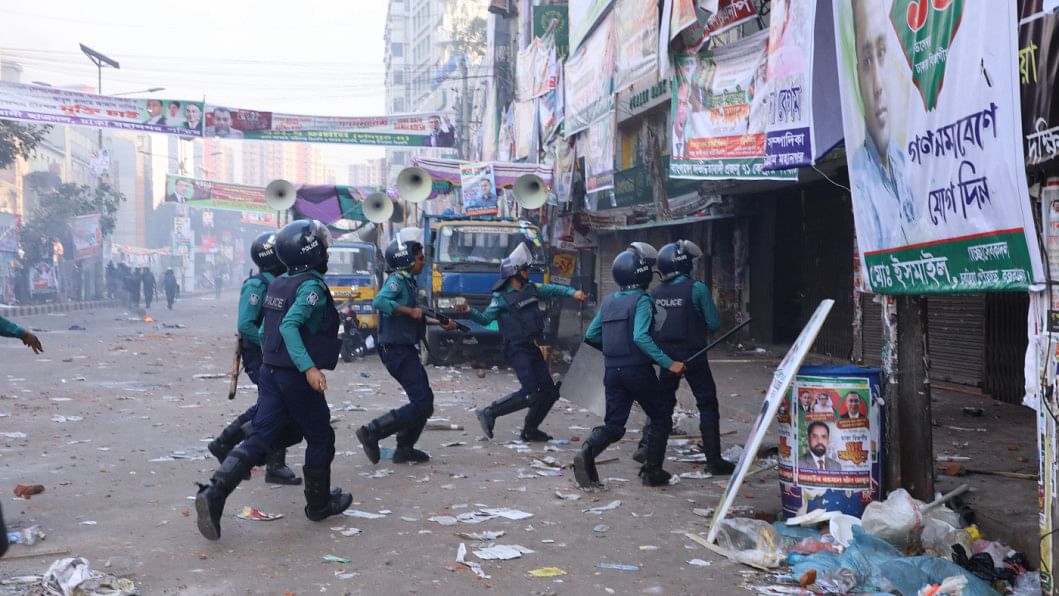
After 51 years of Bangladesh's existence and 32 years of unbroken democratic rule – however flawed – we are proving to ourselves and to the world that we, as a polity, have not matured enough to settle even minor disputes peacefully with those who oppose us. An otherwise simple issue of where BNP should hold its rally has transformed itself into a situation where the public is in full uncertainty as to how the immediate future will unfold.
Simply put, uncertainty is in the air, and all because BNP will not budge and the government will not relent.
Is our government – which has been in continuous power for 14 years and has had time to shape the bureaucracy, law enforcement, intelligence agencies, and other related bodies in ways they wanted – so weak that a proposed public meeting threatens it? Are our law enforcement agencies so ineffective that they have to resort to killing a demonstrator and injuring many instead of trying to contain the meeting? Is physical assault the only way our police know how to manage a crowd? Does the ruling party judge itself to be so isolated from the people that it feels threatened at the prospect of a big public gathering in the capital? The answers to all the above counts, in our view, should have been no. However, from the ruling party's reaction, the reality is obviously not so.
Has the Awami League forgotten its own days out of power when it organised street gatherings without permission, held demonstrations at will, called hartals at the slightest pretext, and blocked street corners almost as a daily affair?
Of course, Awami League did so to promote and protect democracy and the BNP is doing so to destroy it. Only the Awami League reflects the voice of the people and the BNP makes them suffer. Awami League is nothing but an epitome of everything that is good and the BNP is the pits – and so on and on. However attractive such a narrative may appear to the ruling party, as to whether this is believed by the people in general is a question to which we not only don't know the answer, but one we cannot even try to find out, as political opinion survey is hardly possible under the present circumstances. The motive behind any negative outcome will be questioned, its methodology challenged, findings thrashed, and the survey organisers investigated as to whether they harbour any political connection. If none is found, then they will be under surveillance henceforth. So no one else ventures in the same direction.
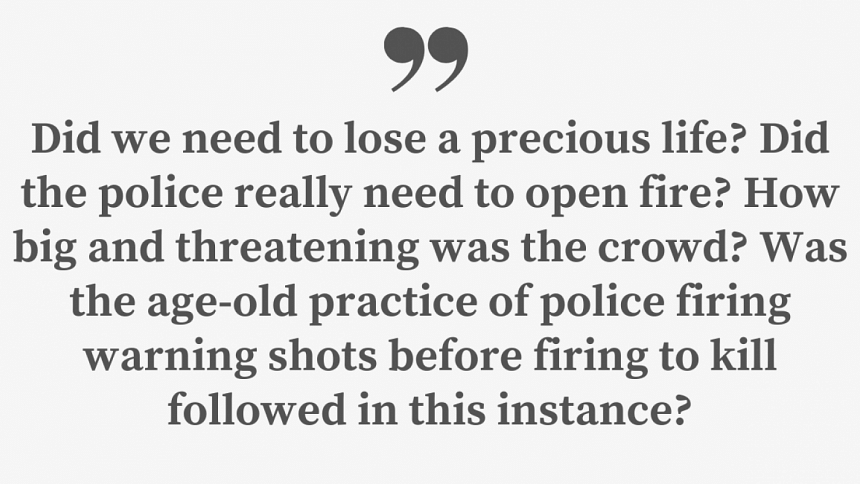
Returning to Wednesday's incident, what we had warned against, desperately hoped wouldn't happen, and pleaded with all concerned that they should avoid, has happened – an opposition activist was killed due to police firing. Did we need to lose a precious life? Did the police really need to open fire? How big and threatening was the crowd? Was the age-old practice of police firing warning shots before firing to kill followed in this instance?
Going by media reports, the answer is a resounding no.
So why did the police act so? Was it to intimidate the opposition workers from desisting to hold the rally tomorrow (December 10)? The reason given for the police refusal was to prevent public inconvenience. A very laudable motive indeed. But did blockading the BNP's office and all the nearby lanes and by-lanes from Thursday mid-morning not cause the public any inconvenience? It has to be mentioned here that BNP frequently holds public meetings in front of their office. (To us, it shows more their weakness than strength.) They have been doing so for years, some of them quite massive.
Why is the government bent upon denying BNP its chosen venue? There hasn't been any clear explanation except police citing public inconvenience, which we have already shown to be a hollow excuse. And why is the BNP so adamant about not holding their rally at Suhrawardy Udyan? Again, the case is not clear. Our guess is that the historic distrust between our two biggest political parties has reached such a state that both think there is a hidden agenda in whatever the other says and does.
There is a serious public question that the BNP will have to answer: couldn't it have held its rally at Suhrawardy Udyan? What is the basis of its objection? And is it serious enough to put its leaders and workers in danger, that has already caused one death, several injuries, and thousands of arrests? One of the BNP's initial objections to Chhatra League's convention preceding their own event was responded to by the Awami League when it preponed that event by a few days. Another objection about the walled nature of the venue could have been resolved by demanding that more temporary gates be built. In our view, BNP's stubborn objection to Suhrawardy Udyan as the venue has not been convincingly explained.
If BNP made a mistake by insisting on Naya Paltan as its venue, Awami League did nothing less by insisting that it cannot be anywhere else.
Given our political culture, which more often than not sympathises with the underdog – Awami League always enjoyed such sympathy whenever out of power – violence against the BNP is more likely to benefit the BNP than the other side. The government's handling of the situation so far appears more and more arbitrary, illiberal, high-handed, and arrogant. The legal position and constitutional rights of political parties for peaceful assembly is being ignored – a fact not lost on the politically conscious Bangalee psyche.
The Awami League leadership is not fully accessing the anti-incumbency factor in today's politics. Bangladesh has never had one political party continuously enjoy unfettered political power for 14 years. How the anti-incumbency factor is and will play out is totally an uncharted territory for us. It will be wise for the ruling party to think about this.
Mahfuz Anam is the editor and publisher of The Daily Star.

 For all latest news, follow The Daily Star's Google News channel.
For all latest news, follow The Daily Star's Google News channel. 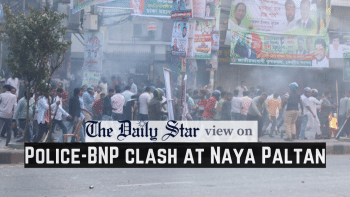
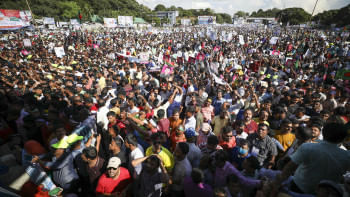
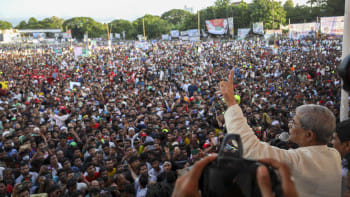


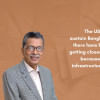
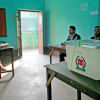


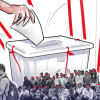


Comments